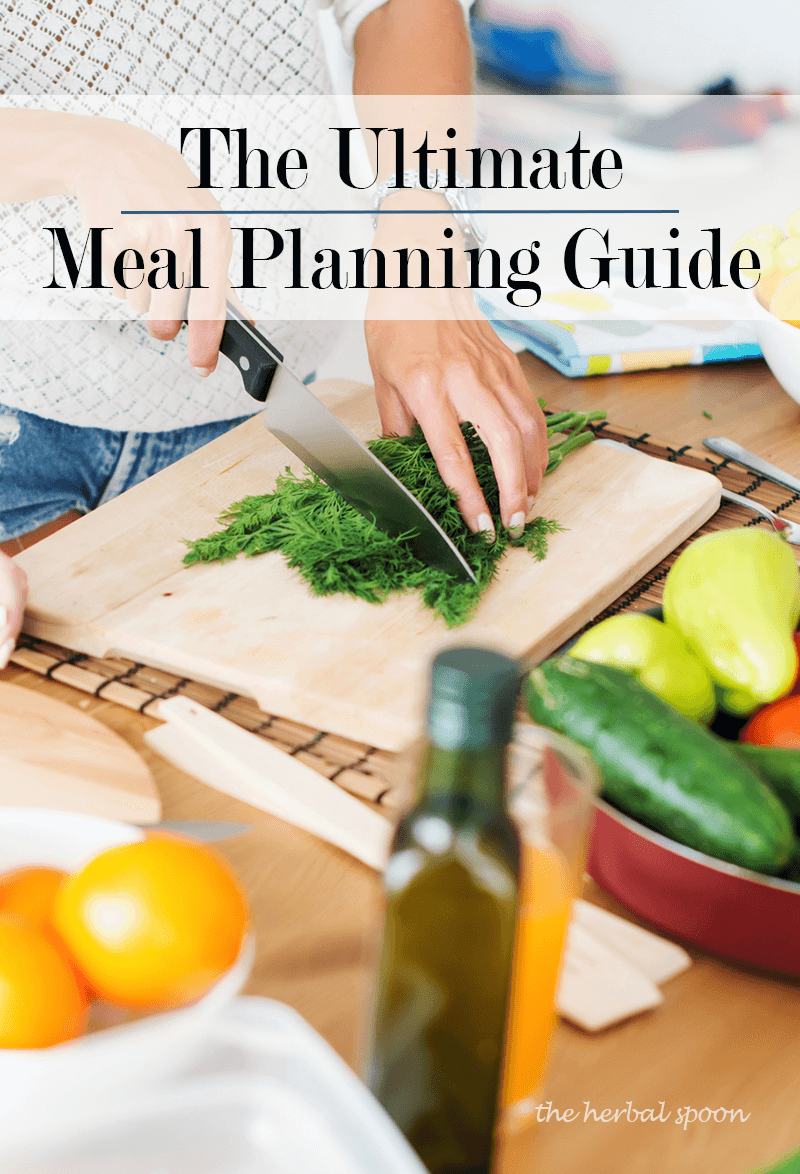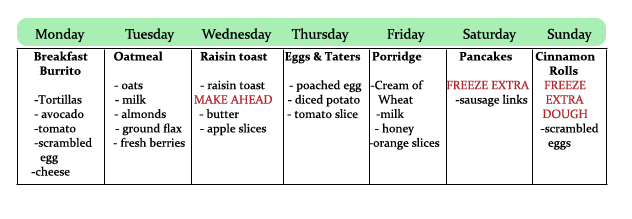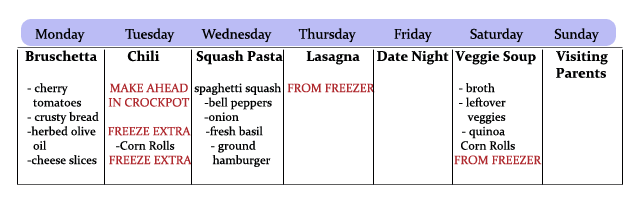 It’s 6:00, you’ve just finished tackling your mountain of laundry, vacuuming the floor for the 8th time and cleaning up those magically appearing toys in the living room when your husband asks, “When’s supper going to be ready.” Ahhh, an overworked mother’s favorite question.
It’s 6:00, you’ve just finished tackling your mountain of laundry, vacuuming the floor for the 8th time and cleaning up those magically appearing toys in the living room when your husband asks, “When’s supper going to be ready.” Ahhh, an overworked mother’s favorite question.
So do you pull out some mac n’ cheese or throw together a stir fry for the 3rd night in a row? No, because you being the organized and responsible person you are have your trusty meal plan!
Ok, maybe this isn’t true for all of us, and I admit to occasionally spacing it when it comes to dinner plans, but it is possible to save loads of money while keeping your evening sanity!
Save Time with Meal Planning
Time is a precious and fleeting thing. With a meal plan you can have exactly what you need on hand and know exactly how you’re going to prepare it. Have you ever started to make something only to realize a main ingredient has gone AWOL? Or maybe that 30 minute meal you saw on the Food Network ended up taking over an hour. Whatever the case I can guarantee we all could use more time in our lives, and a meal plan will supply just that.
You may be thinking though “I don’t have time to do a meal plan.” Do you have time to make multiple trips to the grocery store each week, wandering through all of the aisles for an hour, only to stare at your “empty” fridge and pantry when it comes to meal time? Well if you have time for that then you definitely have time for a meal plan! Mine takes at the most 3o minutes twice a month. If you’re just starting off it will probably take you longer, but practice makes perfect
Money Saving Meals
With a meal plan you have a detailed list of what you’re going to buy. This drastically reduces if not eliminates all of those extras that end up in your cart and in the back of your pantry. Ever get home with your 2 fresh boxes of pasta only to discover you already had 5? Put your money to the best use with a little bit of preparation.

How to Get Started Meal Planning
First, think about what your family needs from their meals. Sit down with a notebook or open a new Word document and start brainstorming. Is Monday soccer night? Do your in-laws visit every Sunday for lunch? Is every other Friday date night
I’ve found that the easiest way for me is to create a 7×5 graph on the computer, put the days of the week at the top and plug in each meal into a square (a sample is included below). I have a separate one for breakfast and supper. Lunch for us is always leftovers or salad from the garden.
#1 Check out the Local Sale Ads
I’ve found that Aldi’s and Kroger have the best prices in our area. Every week
No, you don’t need an apocalypse supply of Ramen noodles in your basement, but coupons can be a great way to save on some pricier items. Once you’ve located items that are for sale at your local store, look online to see if you can find a coupon for it. This can quickly become time consuming and overwhelming, so prioritize. I only look for coupons on the more expensive health food items. Pair the coupon with a sale and your in business! Click here for a lengthy and frequently updated list of coupons to easily locate what you need.
Update: I stopped using coupons now that I’ve found Vitacost for healthy pantry items. Most coupons are for junk food anyway, which we don’t eat.
#2 Rely on Your Local Farmer’s Market
Sure you can write fresh peaches on your February meal plan, but finding locally grown pesticide free ones at that time of year won’t be possible. The easiest way to eat healthy is to make sure you’re eating in season; peaches in July, apples in September, sugar snap peas in April, etc. See what’s in season at your local farmer’s market and make those items the star of your meal plan.
The same is true if you have a garden(which you should!). Many vegetables are interchangeable, so if you don’t have any bell peppers for your spaghetti that day, use the zuchinni instead.
Get to know your local growers and do some bargaining. If you bring them clean egg cartons can you get a discount on eggs? If you buy apples in bulk, will they give you a discounted price
#3 Shop at 8:00 am Wednesday Morning
Or whenever it is your store has the best sales. Ask your store’s manager when the produce is restocked each week. If it’s early Wednesday morning, then chances are many items will be drastically marked down on Tuesday. That’s just an example, but you get the point. Ask questions and learn the rotation of products so you know exactly when to shop.
#4 Write it Down
Now that you have some ideas on how to get started, it’s time to write some things down. I have a list of meals on my computer that are divided into main courses, side dishes, snacks and breakfasts. Every time I create a meal plan I pull from each list and plug it into my calender graph. This makes everything super easy
I don’t use a lot of recipes and tend to just throw ingredients together, but if you’re a recipe person you can include links to the dish right beside it’s listing. Or if you prefer, you can print them all out and organize them in a binder. If you’re using recipes from printed cookbooks then simply include the name of the book and page number on your meal plan.

#5 Make Yo’ List
Once you have your meals plugged into your calender, it’s time to make your grocery list. I’ll admit, when I first started doing this I spent almost 2 hours trying to organize my shopping list. Insane you say? I agree. Through trial and error here’s the best way I’ve found to do it.
Divide your list into categories. Write dairy, meat, fresh produce, grains, frozen foods etc. down as categories on a sheet of paper, or type it out. Leave plenty of room underneath each category to add your items.
Go through your meals one at a time, noting each ingredient and writing it down under the appropriate category. If you need 2 pints of cherry tomatoes on day one, and another 3 on day five, simply write it down as 5 pints. Or you can use tally marks beside each item to represent the units needed.
When you get to the store having everything divided into categories will save you a lot of time! When you’re in the dairy section at the store, simply reference your dairy category on your paper and off you go!
Now that it’s summer we rely on the garden and weekly farmer’s market for fresh produce. In the cooler months, however, I shop the produce section of our grocery store once a week. Other items, like pantry staples can be purchased once a month to save even more time
#6 Cook Ahead
Many items can be doubled and frozen. If you know you’ll have extra time Saturday morning to make a large batch of pancakes, those can be frozen for next Thursday’s meal. Check out this post for more make ahead meal ideas that will save you time. The best part is the fresh baked goods that take zero extra prep time
At the end of the week to make sure you’ve used up any extra veggies and other perishable items, make a “catchall” dish. Shepherd’s pie, vegetable soup or stir fry are some ideas.
My Meal Plan
Here is a sample of my breakfast and supper meal plans. I print these out and post it on my fridge for easy reference. Keep in mind that I don’t use recipes, just ingredient lists, so this is what works best for me. If you’re a recipe person, then you could instead list the recipe name and where to find it (either the web URL, or the cookbook page). Lunch for us is always leftovers or salad. Feel free to leave a space for lunch on your meal plan though if it works for you.
Sample Breakfast Meal Plan

Sample Supper Meal Plan

I’m trying to get better about this! It’s probably my greatest struggle as a homemaker. Visiting from A Mama’s Story!